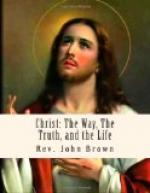3. We would not think, that upon our taking of this course, we shall be instantly freed from challenges, because of those sins, for pardoning whereof we take this course; nor should we think, that because challenges remain, that therefore there is no pardon had, or that this is not the way to pardon; for, as we shall show afterward, pardon is one thing, and intimation of pardon is another thing. We may be pardoned, and yet suppose that we are not pardoned; challenges will abide till the conscience be sprinkled, and till the Prince of Peace command peace to the conscience, and put the accuser to silence; who, when he can do no more, will mar the peace of a believer, as long as he can, and stop the current of his comforts, which made David pray, that “God would restore to him the joy of his salvation,” Psalm li.
4. Nor would we think, that upon our taking of this course for the pardon of our sins, we shall never thereafter meet with a challenge upon the account of these sins. It is true, when sins are pardoned, they are fully pardoned in God’s court, and that obligation to condemnation is taken away, and the pardoned person is looked upon as no sinner, that is, as no person liable to condemnation because of these sins; for being pardoned he becometh just before God; yet we dare not say, but conscience afterward, being alarmed with new transgressions, may mistake, as people suddenly put into a fight are ready to do; nor dare we say, that God will not permit Satan to upbraid us with those sins, which have been blotted out long ago, as he suffered Shimei, who was but an instrument of Satan, to cast up to David his blood-guiltiness, which had been pardoned long before. The Lord may think good to suffer this, that his people may be kept humble, and made more tender and watchful in all their ways.
5. Believers would not misimprove or abuse this great condescendency of free grace, and take the great liberty to sin, because there is such a sure, safe, and pleasant way of getting those sins blotted out and forgiven. “Shall we sin because we are not under grace, but under the law? That be far from us,” saith the Apostle, Rom. vi. 15. This were indeed to turn the grace of God into lasciviousness. And it may be a question, if such as have really repented, and gotten their sins pardoned, will be so ready to make this use of it; sure sense of pardon will work some other effect, as we see, Ezek. xvi. 62, 63.




